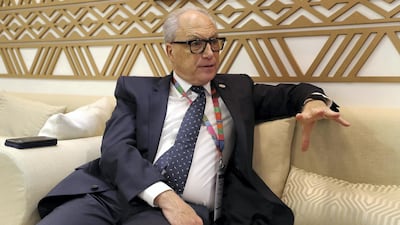Saudi Arabia’s Diriyah Gate tourism project will award 600 contracts this year worth $2 billion as the kingdom anticipates a "big boom" in global travel after a rapid Covid-19 vaccination campaign.
The $20bn project is progressing "on time and on budget" despite the pandemic, Jerry Inzerillo, chief executive of the Diriyah Gate Development Authority, told The National yesterday. Some assets are expected to open by the end of the year and there are clear government directives to press ahead with its development.
“During Covid, when there would have been full justification to slow things down, they accelerated Diriyah and said ‘no, we cannot lose time because as part of our national tourism strategy, we will overcome Covid and we want people to come to the kingdom’,” he said.
While the government prioritised measures to protect staff and local communities, it directed that the project “proceed without delay because this [Covid] will pass and we have to make sure we are ready to welcome people from all over the world”.
Diriyah Gate is a 7-square-kilometre site with the At-Turaif Unesco World Heritage Site at its core. It is one of several big projects that the kingdom is pursuing amid plans to raise the economic contribution of the tourism sector from 3 per cent of gross domestic product to 10 per cent by 2030.
Phase one is “slightly ahead” of schedule, with assets expected to open by the end of this year and in the first quarter of 2022, he said.
These include 19 restaurants within Bujairi district, the project's first hotel and museum, new green parks and infrastructure worth several billions of dollars underneath the city to support the site, said Mr Inzerillo.
The 600 contracts to be awarded this year will mainly be for infrastructure, architecture, engineering, land acquisition, site preparation and deals with hotel operators. The authority’s board will meet in June to approve the list of hotel brands, which are “pretty much all lined up now”, and also announce “some very major assets” after the meeting, he said.
Upon completion in 2030, Diriyah Gate will have the capacity to host seven million tourists, said Mr Inzerillo.
Before the pandemic, when Saudi Arabia opened its doors to international tourists, it handled 55,000 visitors.
“We are optimistic they are going to come in great numbers,” he said.
In the next two or three years, 80 per cent are expected to be domestic visitors and 20 per cent foreigners but that will even out as more people come to visit the “cultural icon” of the kingdom.
“There is only one Diriyah. It is the birthplace of the kingdom,” said Mr Inzerillo. “It is the Colosseum to Rome and the Acropolis to Athens.”
Inbound travel is set to rebound, “without a doubt”, because of pent-up demand.
“We are going to go through a very big boom once we get [people] globally vaccinated,” said Mr Inzerillo. “The rest of this year is still going to be a challenge but if people can go to safe places such as Saudi Arabia and the Emirates, which have done a good job, then you are going to see that rush.”
There will be an “immediate and abundant” influx of local travel followed by a “big rush” in regional travel. However, the long-haul segment is set to take two years to recover, he said.
Foreign investors had expressed “substantial” interest in taking up equity stakes in commercial assets at Diriyah before the pandemic, said Mr Inzerillo. While a lot of interest still exists, the pandemic has forced hotel bosses around the world to put their plans on ice.
In the meantime, there is a surge in interest from entrepreneurs in the kingdom who want to invest in the projects.
“We have a very substantial backlog of Saudi investment, especially in the commercial assets of hotels, restaurants and retail,” he said.
Saudi entrepreneurs have committed more than $1bn over the past two years.
“On assets that are not as commercially viable such as infrastructure, museums, mosques, universities, the Diriyah Gate Development Authority will put up the principal equity for that,” he said.
Entrepreneurs from the UAE and Kuwait have also shown “substantial interest” in the commercial assets while there have been inquiries from Bahrain and Qatar, said Mr Inzerillo.
He said agreements had been signed.
Diriyah Gate employs 950 people, 80 per cent of whom are Saudis.











